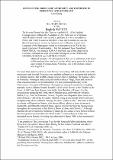Files in this item
Conflicting models of authority and expertise in Frontinus’ Strategemata
Item metadata
| dc.contributor.author | König, Alice | |
| dc.contributor.editor | König, Jason | |
| dc.contributor.editor | Woolf, Greg | |
| dc.date.accessioned | 2017-11-22T12:30:20Z | |
| dc.date.available | 2017-11-22T12:30:20Z | |
| dc.date.issued | 2017-02 | |
| dc.identifier | 16931091 | |
| dc.identifier | 2562af16-9802-4fc5-a962-5fb9cc435f5a | |
| dc.identifier | 85047405340 | |
| dc.identifier.citation | König , A 2017 , Conflicting models of authority and expertise in Frontinus’ Strategemata . in J König & G Woolf (eds) , Authority and expertise in ancient scientific culture . Cambridge University Press , Cambridge , pp. 153-181 . https://doi.org/10.1017/9781107446724.008 | en |
| dc.identifier.isbn | 978107060067 | |
| dc.identifier.isbn | 9781107446724 | |
| dc.identifier.other | ORCID: /0000-0002-0245-5303/work/61622294 | |
| dc.identifier.uri | https://hdl.handle.net/10023/12149 | |
| dc.description.abstract | At the start of his Strategemata, Frontinus claims to be (almost) unique in having drawn up a ‘science’ of warfare. He is referring to his now lost treatise, On the Art of War, and stamping his authority and expertise on the subject as he embarks on a sequel. But thereafter in his Strategemata, a collection of examples of successful military strategy which he claims was designed to complement and complete the De Re Militari, Frontinus absents himself from the bulk of the text, refusing to act as an internal commentator or authoritative guide (in the style, for example, of Valerius Maximus, with whom Frontinus invites comparison). In so doing, he cedes authority (at least temporarily) to the material he presents, to the generals who fill his pages and the ‘wisdom’ which their deeds embody; he claims credit merely as a compiler of their stratagems, as the facilitator who is making their expertise available to others. This manoeuvre promotes the idea that one merely has to read to learn (and, in due course, do); but the reading and learning experience which this text offers proves significantly more challenging than that. In fact, the text seems to problematize the act of learning-from-reading right from the start. Its opening section exposes the trickiness of texts, serving up a series of exempla which teach aspiring generals not to believe all that they read. They will also search in vain for a stratagem which was inspired by a book; instead, they will be bombarded with example after example of native cunning, innate wisdom and natural intelligence. And the array and (carefully ordered, but also subtly disorientating) arrangement of exempla in the Strategemata, and the emphasis which the whole collection places on spontaneity and surprise, threaten to undermine not just this but other military treatises, in particular theoretical works which set out hard and fast rules for engagement. For if this ‘handbook’ teaches readers anything, it teaches them that no book – no matter how many theories or exempla it may contain – can prepare a general for every eventuality: generalship is not exactly a science. This text, in other words, toys not only with its author’s but also with its own authority, and with the authority of other such works (including Frontinus’ own De Re Militari), by raising questions about the nature and transferability of military ‘expertise’. The twist in the tale is that Frontinus turns up within the Strategemata as an exemplum himself – twice – acquiring authority as a doer not (just) as a writer. His own journey from deed to book makes the challenge he has set his readers – to see if they themselves can make that leap, but the other way around – all the more pressing. In exploring these themes, this chapter will investigate textual and authorial authority in the exempla tradition more widely; the currency and exchange of different kinds of knowledge/learning in the military sphere; and the political (Domitianic) context, which (I will argue, via comparison with other texts) may have influenced the ways in which Frontinus presents his own – and other commanders’ – expertise and authority. | |
| dc.format.extent | 293505 | |
| dc.language.iso | eng | |
| dc.publisher | Cambridge University Press | |
| dc.relation.ispartof | Authority and expertise in ancient scientific culture | en |
| dc.subject | Q Science (General) | en |
| dc.subject | BDC | en |
| dc.subject | SDG 16 - Peace, Justice and Strong Institutions | en |
| dc.subject.lcc | Q1 | en |
| dc.title | Conflicting models of authority and expertise in Frontinus’ Strategemata | en |
| dc.type | Book item | en |
| dc.contributor.sponsor | The Leverhulme Trust | en |
| dc.contributor.institution | University of St Andrews. Centre for the Literatures of the Roman Empire | en |
| dc.contributor.institution | University of St Andrews. School of Classics | en |
| dc.identifier.doi | https://doi.org/10.1017/9781107446724.008 | |
| dc.description.status | Peer reviewed | en |
| dc.identifier.url | https://www.cambridge.org/gb/academic/subjects/classical-studies/ancient-history/authority-and-expertise-ancient-scientific-culture?format=HB&isbn=9781107060067 | en |
| dc.identifier.grantnumber | RF-2012-021 | en |
This item appears in the following Collection(s)
Items in the St Andrews Research Repository are protected by copyright, with all rights reserved, unless otherwise indicated.

